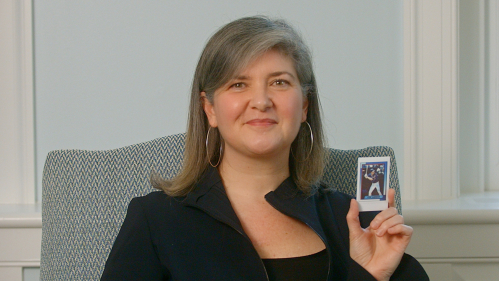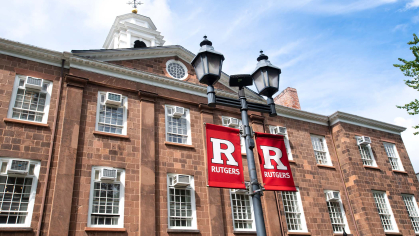Rutgers Chief of Staff Shaped by Purposeful Approach
A proud Chicago Northsider with a deeper loyalty for the Cubs than deep dish pizza, Andrea Conklin Bueschel has ventured from her Midwest roots before, just never during a global pandemic. So, when the opportunity to traverse the Big Ten landscape presented itself in July, the decision to further grow in New Brunswick was not as difficult as one might expect.
“The farther along I get in my career, the more I care about the type of leader I work for,” said Bueschel. “It’s no longer about having the job, but rather the integrity and values of that person, their ambitions and aspirations.”
“That person” in this instance is Rutgers University president Jonathan Holloway. After working closely with him at Northwestern University for three years as associate provost for strategy and policy, Bueschel now serves as his chief of staff and senior vice president for administration. In the role, she oversees the operations of the President’s Office and the Office of the Secretary, while playing a critical role in the coordination of the universitywide offices.

With coronavirus further complicating the logistics and economics of higher education, Holloway and his leadership team have both old and new challenges to navigate. Bueschel, who occupies the office closest to Holloway’s, is well suited for the pursuit. During her 30 years of working in and around higher education, she has served as a research scholar at the Carnegie Foundation for the Advancement of Teaching, as associate vice president at the Spencer Foundation and as an assistant and associate provost at Northwestern, as well as in other academic and administrative roles. Concurrently she has taught graduate courses in higher education policy over the years.
“I think I’m able to see the forest,” said Bueschel, whose perspectives were often shaped in the forest, literally. Her grandparents operated a camp in Cooperstown, N.Y., inspiring a family tradition of camping trips in the Great Lakes region. Her childhood summers also included spending a month at camp in Northern Michigan, and as a college student she worked at a summer camp in Maine as a counselor.
Her time at camps helped her think more about the collective and her part in it. She embraced the idea that you could work together for a common purpose and have goals in service of something bigger than yourself. As far as the forest, looking across and making connections is a key skill that is serving her well in her role as chief of staff, where she has to synthesize and make sense of a great deal of information each day.

Andrea Bueschel, a Utility Infielder
Her interest in learning from others and serving that common purpose has shaped many of Bueschel’s major life decisions.
While many of her classmates selected large Midwestern universities in the Big Ten, she followed the advice of her uncle, also an academic. He recommended Bates College in large part because his mentor, Benjamin E. Mays, a civil rights leader and president of Morehouse when her uncle was a student there, was an alumnus.
Established by abolitionists in the 19th century, Bates, he thought, was founded on values that aligned with those of their extended family. Bueschel’s maternal grandfather was a minister who espoused pacifist views; her mother is a retired minister still active in peace and justice movements with her father. Her siblings and several of her cousins teach, practice law and serve in government. The smaller community at Bates – half the size of her large, public high school in Illinois – was the right next step for Bueschel to start articulating her own values more independently.
“I was prepared for a change and eager for a more inclusive community,” said Bueschel. “Bates aligned with my values and what I cared about. We used to joke that Bates’s endowment was smaller than other colleges because we were best at graduating preachers and teachers.” As it turned out, Bueschel became both a teacher and a preacher, though the latter is ordination-by-internet so she could officiate wedding ceremonies for several of her friends. Her work after college cemented the teacher identity she developed as a camp counselor, even as the roles veered into educational administration.
After earning her undergraduate degree in philosophy and working in admissions and student affairs offices following graduation, Bueschel ventured west to San Francisco and attended Stanford University, where she earned master’s degrees in higher education and sociology and a Ph.D. in education policy. The Bay Area community’s diversity and progressiveness not only proved to be familiar but also inspired her to serve as a foster parent and, with her family, formed the network of people who supported her through two rounds of breast cancer.
“There’s a Robert Frost poem that helped me through my first diagnosis that says that the best way out is always through,” said Bueschel. “You can try to get around it, not approach it, or any number of things to avoid whatever the ‘it’ is, but the best way out is to always keep moving through.”
“Moving through” is a relatable sentiment right now to people at Rutgers and beyond. As everyone looks for ways to manage the challenges of 2020, Bueschel has turned to pottery, a relatively new hobby. “I’m still a beginner, and one of the first things I learned is that you can’t start to shape the clay until you’ve centered it on the wheel, which is a pretty good reminder for lots of things: center yourself as you start something,” Bueschel said.
With COVID-19 cases rising as the fall semester draws toward a close, Bueschel has found herself drawing on the personal and professional foundations that provide that centering of purpose for her. The pandemic has limited her ability to explore the campus and interact with the Rutgers community, and she knows she has much more to learn. Despite the decreased physical engagement, she does her best to capitalize on the frequent video conferences and phone calls that serve as an alternative as she gets to know the institution and its people.
“What’s been fascinating is how many people, from all parts of the institution, have made a point that ‘this just feels different, like a new chapter,'” said Bueschel. “There is a sense that Jonathan is the right person for the moment. We are working to meet that moment.”


